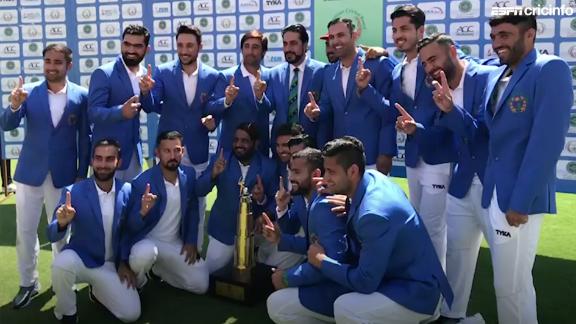Stumps Ireland 22 for 1 (Balbirinie 14*, Stirling 8*) and 172 trail Afghanistan 314 (Rahmat 98, Asghar 67, Shahidi 61, Thompson 3-28, McBrine 2-77) by 120 runs
Ireland made a brief comeback but the late wicket of captain William Porterfield followed an Asghar Afghan counterattack to dull the effect in a session where six wickets fell. Asghar made 67, batting mostly with the lower order, and helped Afghanistan go 142 ahead. In response, Ireland were 22 for 1 with Paul Stirling and Andy Balbirnie at the crease.
The Afghanistan captain was aggressive as his team fell from 226 for 3 to 280 for 8, before digging into the spinners and switching to a full-blown attack. He hit three sixes and a four - stepping out for each one of them and going straight - as he stretched the score to 311 before edging Stuart Thompson behind. Asghar made 31 off his last 21 balls.
At the start of that collapse, Rahmat Shah fell agonisingly short of a historic maiden century - it would have been Afghanistan's first in Tests - when he chopped Tim Murtagh on for 98, but his 130-run stand with Hashmatullah Shahidi had put Afghanistan firmly ahead by then. The pair, arguably Afghanistan's best batsmen, used the middle session to dominate an Irish attack that had kept them to 20 off 16 overs in the first hour of the day. That plan from Ireland - full and straight - proved unsustainable as the first session went on, and completely came apart in the second.
Rahmat had hit 15 boundaries and looked in complete control before chasing Murtagh's short and wide ball, following an extended stop in play as Ireland waited for a helmet to come on for their close-in fielder. The inside edge hit off stump, a moment that left everyone in the Afghanistan camp shaking their heads.
Just as Afghanistan had failed to manage the game in the middle session on Friday, so did Ireland on Saturday. And Rahmat made use of that period with efficiency, playing close to his body for the most part, but attacking in bursts as the spinners seemed to lose control. At one point, he hit five boundaries in four overs, including two elegant drives either side of extra-cover - shots that had earlier seemed impossible on this track. Between those cover drives, he smashed a short ball past mid-on to take Afghanistan into the lead shortly after the pair had brought up 100 for the third wicket.
It was a dominant phase in the middle of the day, with even the watchful Shahidi opening up to pick up boundaries with ease. Most of these came against James Cameron-Dow who consistently bowled short deliveries through the day, allowing both batsmen to escape any pressure from a pitch that was slowly showing signs of sharp turn. So off-colour was Cameron-Dow that after going steadily for over five an over, he resorted to a leg-side line against Rahmat. In the 79th over, this cost him: umpire Richard Illingworth deemed it negative bowling and called him for wides three balls in a row.
But there was an unlikely upside. Afghanistan's willingness to push the rate opened up a vulnerability and when Andy McBrine was brought on to replace Cameron-Dow, his floaty middle-stump ball caught a sweeping Shahidi on the back leg. Batsmen found it increasingly difficult to get in after that. Immediately after Rahmat's wicket, Mohammad Nabi flicked a leg-stump half-volley to square leg, and McBrine returned again to completely tie up Ikram Ali Khil. After a lot of indecisive footwork, the left-hander ended up yorking himself against McBrine, who looked by far Ireland's best bowler on the day with his attacking lines to both right- and left-hand batsmen.
Rashid Khan and Asghar made it clear they would look to make quick runs and push the lead up, but George Dockrell stopped Rashid in his tracks. After being hit for 10 off 2, including an inside-out six that was one of the best plays of the day, Dockrell slid an arm ball past Rashid's inside edge to trap him in front. But Ireland couldn't stop the bleeding and the lead - just a touch over 100 at that point - grew to an imperious figure.




